Rerouted
| April 3, 2023Sometimes it’s the detours that remind us Who forms man’s footsteps and watches over His nation
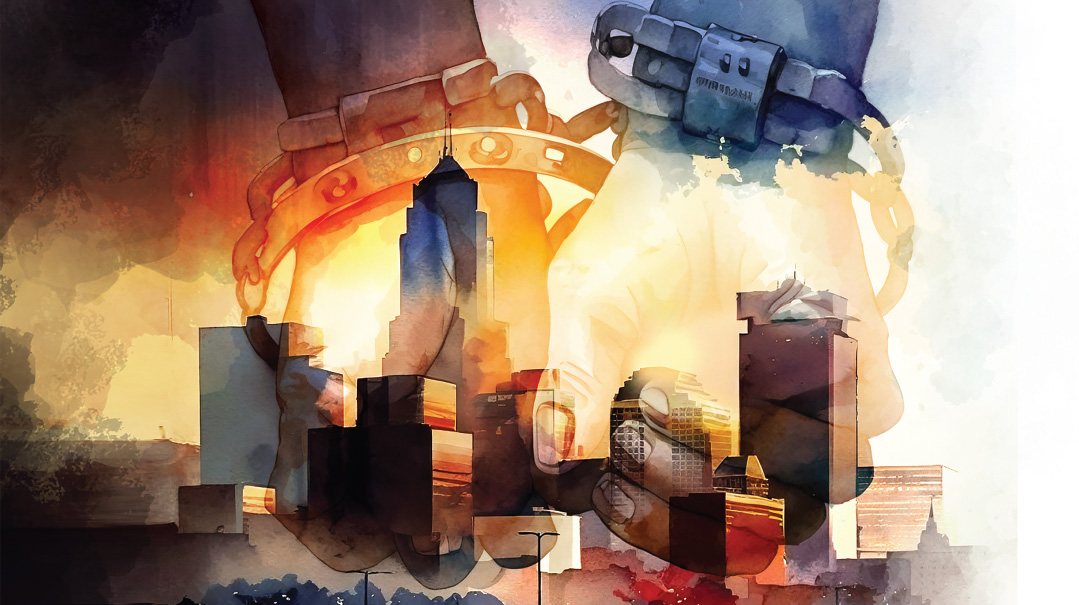
Mistaken Identity
Name: Barry Klein*
Destination: Mexico City
I
was traveling from New York to Mexico City for a business trip. I missed my early-morning flight, but was able to get onto the next flight. There was a catch, though — two of them — stopovers in Dallas and San Antonio, Texas. With no alternative, I got on the flight.
I landed in San Antonio later that evening with time to spare until my connecting flight to Mexico. After strolling through the airport and picking up a snack, I figured I’d head for the gate. But I wasn’t sure where it was, so I asked a police officer for directions.
He stared at me suspiciously. “Do you have identification?”
Confused, I handed him my passport. He stared at the passport, looked back at me and then at the passport again.
“Go stand against the wall!” he commanded. His voice was shaking. “Put your hands up!”
He slapped handcuffs onto my wrists and suddenly I was surrounded by 12 police officers.
Another officer took pictures of me and everyone in the airport began running away in fright. One frazzled young mother grabbed her children and scurried away as though I were the world’s most wanted criminal.
“What is going on?” I finally asked.
“You’re coming with us,” one of the officers replied. I was led through the terminal accompanied by 13 police officers, as I wracked my brain, trying to imagine what crime I could have possibly committed. This was a terrible mistake, but I was too frightened to open my mouth.
T
hey led me into a security office where a detective sat behind a large desk. He was wearing a large cowboy hat and his cowboy boots were perched casually on the desk. He stared at me for a long moment. “A man has been murdered in Dallas, Texas, and you fit the description of the murderer.”
Turns out, I happened to be within the same height and weight range as the murderer. I was also wearing a similar gray suit, blue shirt, and dark brown loafers. I shared the same color hair, and had a similar short beard. I had just arrived from Dallas, and as far as the police were concerned, they’d clinched the case.
They interrogated me for the next hour, asking me pointed questions in rapid succession. They went through every stitch of my suitcase, asking me questions about various items. The fact that I was obviously Jewish made matters worse.
When they began taking mugshots, I started to fear for my life. The penalty for murder in Texas is very serious; death to be exact. It was the most frightening hour of my life.
The detective checked the ticket from my previous flight, and then contacted the airline. He wanted to know exactly what time my flight took off from Dallas. The airline confirmed that the plane took off at 5:19 p.m. (We actually took off several minutes early, which was an enormous blessing.)
The murder had occurred at 5:28 p.m.
Suddenly, the tone in the room changed and everyone relaxed. “You were already on the plane at the time of the murder,” the detective said, standing up to remove my handcuffs.
Just like that, I went from being a common criminal to a VIP. I’d missed my connection, and they promised to get me on the next flight.
When I finally settled onto the plane to Mexico City, I took a deep breath, and sent a prayer of thanks Upward. If my flight from Dallas had taken off even several minutes later, my day would have ended very differently.
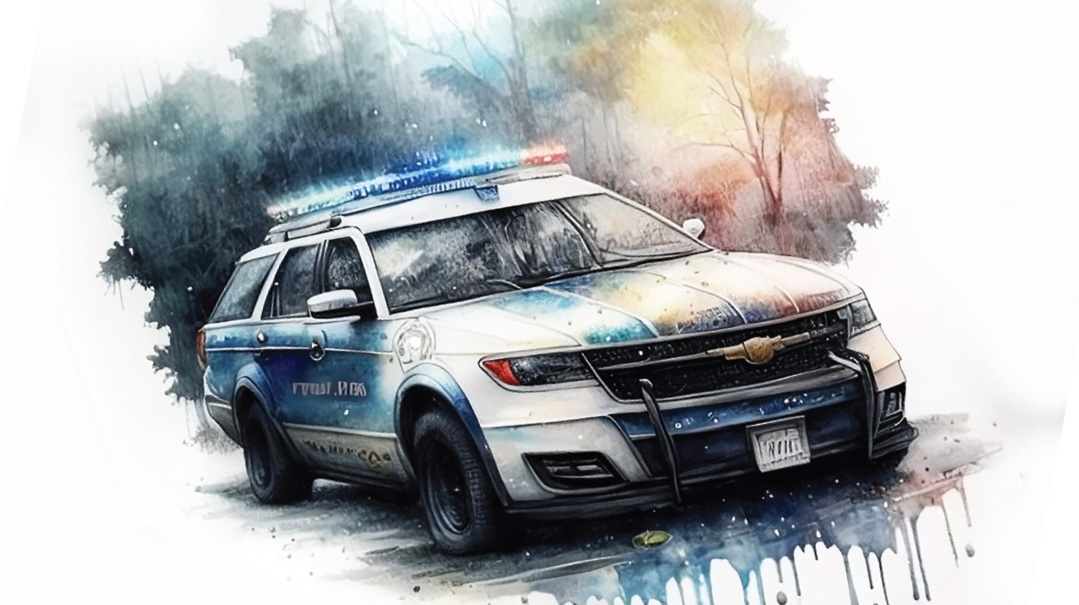
It’s a Deal
Name: Yael Ishakis, Mortgage banker
Destination: Lakewood, NJ
O
ne early morning I traveled to Lakewood for a presentation I was giving to a group of agents. I had just gotten off the parkway when I checked my phone for directions. Moments later, I was pulled over.
A police officer walked up to my car and asked for my license and registration. We’d taken a family trip the day before, and my car was a colossal wreck. When I finally found the papers, he glanced around and commented on the state of my car.
“I’m a little embarrassed by the mess,” I admitted when he handed me my ticket. “I took the kids out yesterday and I haven’t had a chance to clean yet.”
“Why don’t you give your kids five bucks and have them clean the car?” he said. “I was a service member in the military and that taught me a thing or two. I expect a lot from my children! Kids today don’t do anything! They are terribly lazy. You have to raise your kids with expectations!”
“Maybe I got pulled over so I can learn something from you,” I said.
We chatted for a few minutes, and I thanked him for his service in the military, which he visibly appreciated.
“If I knew how nice you were I wouldn’t have given you a ticket,” he said. “Safe trip! Where are you going?”
“I’m a loan officer. I’m going to give a lecture.”
His face lit up. “I’m looking to sell my house, and relocate out of the Lakewood area.”
I smiled. “What a deal! You give me a ticket, and I’ll give you a loan.”
He laughed and we exchanged cards.
He actually called me the next day and I took good care of him. His loan went through within the month and I was also able to refer an agent to sell his home.
I don’t recommend taking out a phone while driving, but the meeting was certainly serendipitous. The ticket cost me 250 dollars (no points, it was out of state) and I struck gold with a client who connected me to his circle of friends. Not a bad deal at all.
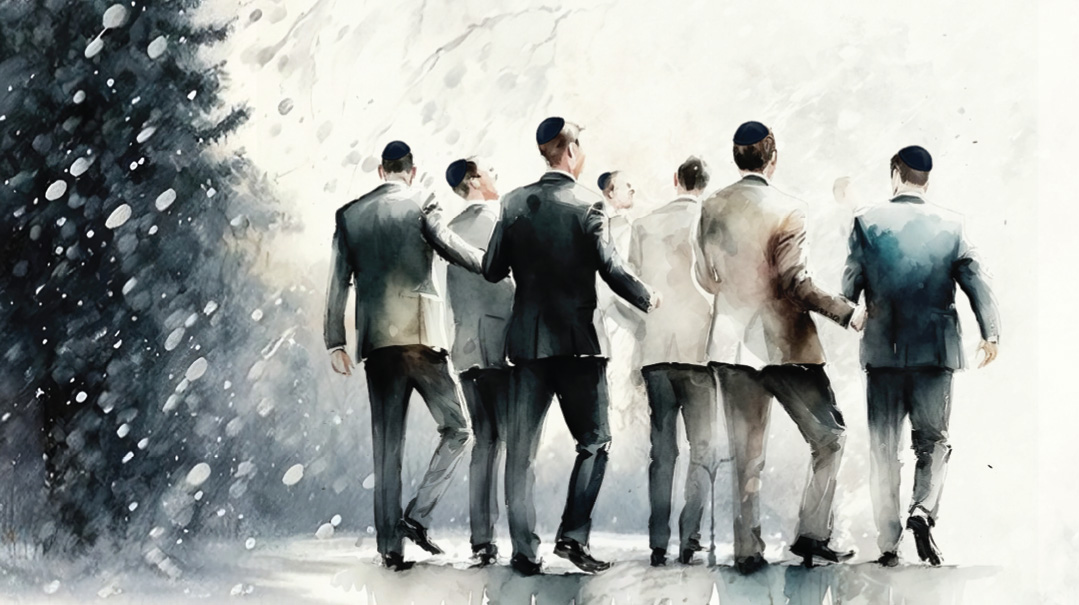
Family Simchah
Name: David Cohen*
Destination: Flatbush, NY
IT
was January 7, 1996, and my cousin, orphaned of both parents, was scheduled to get married that night.
But New York was covered in 20 inches of snow, during one of the most severe blizzards to ever hit the city. With wind gusts over 50 mph and eight-feet snow drifts, it was impossible for anyone to go out.
But the show had to go on, and all involved were determined that the wedding would be beautiful and lively, despite the weather.
The first issue was transportation for the kallah’s elderly grandparents, who were supposed to walk her down to the chuppah. They were stuck in New Jersey, and it would be risky to drive an elderly, frail couple through a blizzard. After some deliberation, a brave volunteer picked them up in a pickup truck. The trip took most of the day, but thankfully, they were in the last car allowed onto the Verrazano bridge.
With that settled, the other elements of the wedding had to be dealt with. The photographer and band canceled. Ninety percent of the guests didn’t think they could make it. We were looking at a very grim wedding: no guests, no music, and no pictures.
The kallah’s rav called every band and photographer in Brooklyn, begging them to make it to the wedding hall. No one could promise anything, but in the end two large bands and two photographers made it to the hall.
By midafternoon, another volunteer with a Suburban began picking up family members and friends in the Brooklyn area. He was able to pick up 14 people at a time, in a very long and harrowing drive through the disastrous Brooklyn streets. Still, that only brought in a handful of guests.
The kallah’s relatives called everyone within a four-block radius of the wedding hall, asking them to put on their boots and walk to the wedding hall. Arriving at the hall, we looked around anxiously: Would anyone venture out?
The kallah was emotional as she watched the empty wedding hall fill up (mostly with strangers), but the men’s side was still rather sparse. The chassan was from out of town and virtually none of his guests made it.
We needed men. We needed a crowd of bochurim. Then someone had a brainstorm that saved the night: Mir Yeshiva! It was several blocks away, and as soon as the boys heard about the cause, they ran over. It was amazing to watch streams of jubilant bochurim pour into the wedding hall covered from head to toe in snow.
Every seat at the chuppah was filled. The dancing was so lively that no one could have known that the chassan and kallah danced the night away with hundreds of strangers. It was a magical night spent with their extended family of Klal Yisrael.
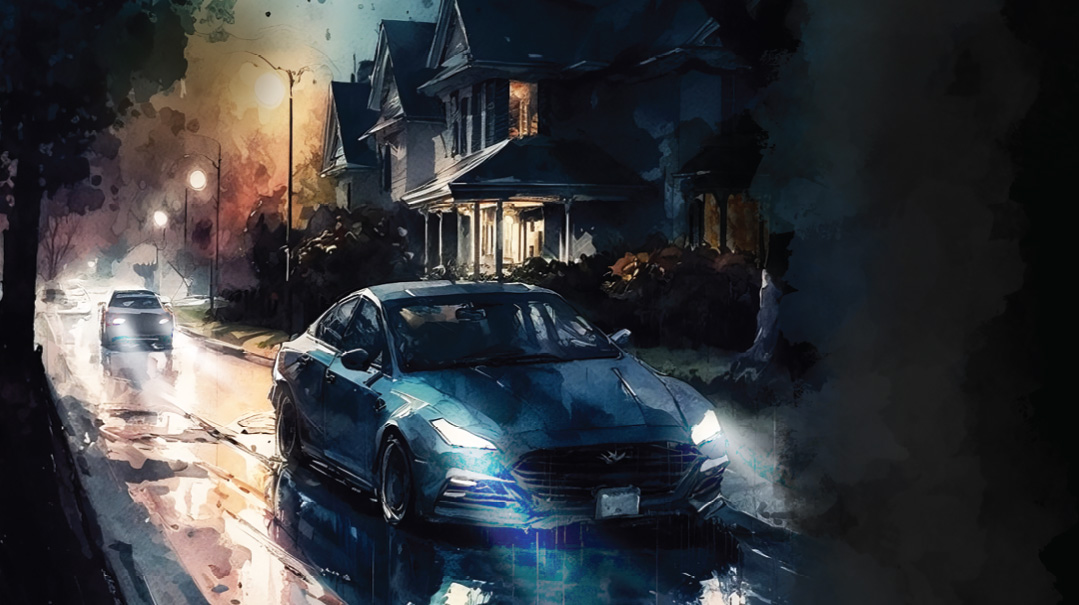
Caught in the Middle
Name: Yanky F.
Destination: Lakewood, New Jersey
I
was learning in a yeshivah in Monsey and had an off-Shabbos coming up. There were no buses leaving to Lakewood Thursday night, and I couldn’t find a ride, so my parents decided that the safest option was an Uber, as then they could track me with the Uber app.
My driver, Abigay, a recent Jamaican immigrant with dreadlocks, pulled up, and I got into the car. Things went well until we hit traffic on the Garden State Parkway at exit 147. Abigay decided to get off the highway and take the side streets of East Orange, parallel to the highway.
I tensed; East Orange is a shady, crime ridden neighborhood with dark streets and old, rundown homes, but there wasn’t much I could do.
Then I suddenly felt a jolt. Someone had rear-ended us, causing our vehicle to hit the car in front of us, leading to a multiple car pile-up. Abigay got out of the car to assess the damage and talk to the driver that hit us. But within seconds, the first driver sped off from the scene of the accident.
Abigay didn’t take that well. He jumped back into the car and slammed the door. “Were going to get him! He’s going to pay for what he did!”
He sped off at a terrifying speed, racing through the dark, mostly deserted side streets. He blew several red lights and drove recklessly, as I sat in the back seat holding on for dear life. My parents received a notification about the diversion from the planned route and called me sounding frightened. “What’s going on?” they asked.
I could hardly talk. “I feel like someone’s about to get shot and I hope it’s not me,” I blurted.
My parents were having a panic attack, but there was nothing they could do but daven.
At last, Abigay cornered the other driver into a dead-end street. I was shaking in fear.
“Hey! Can you call 911?” Abigay called back to me. “Tell them what streets we’re on and tell ’em to get here fast!”
Several residents came out of their homes to watch the action and they helped Abigay surround the driver to keep him from fleeing. I closed my eyes, scared to watch. Who knew what kind of weapons the other guy had?
I breathed a deep sigh of relief when the police pulled up a few minutes later. I just wanted to get home, but Abigay’s car was overheated from the impact of the accident. (How he whipped around town on the chase remains a mystery.)
The police officers offered to escort me to the police station, but in the end they waited with me on the street until my older brother drove in from Lakewood to pick me up.
In the meantime, Hashem sent two malachim to take care of me. In the midst of the crime-ridden neighborhood, an elderly African-American couple came out of their home. They were incredibly kind, soft-spoken people. They offered me a drink, emotional support, and just sat next to me on the street as I waited for my brother. I will never forget their kindness.
When my brother arrived, Abigay greeted him warmly and shook his hand.
“Sorry about the action!” he chuckled, “But your brother is such a great guy! I heard that you’re respectful people, but now I have a totally new appreciation of the Jews!”
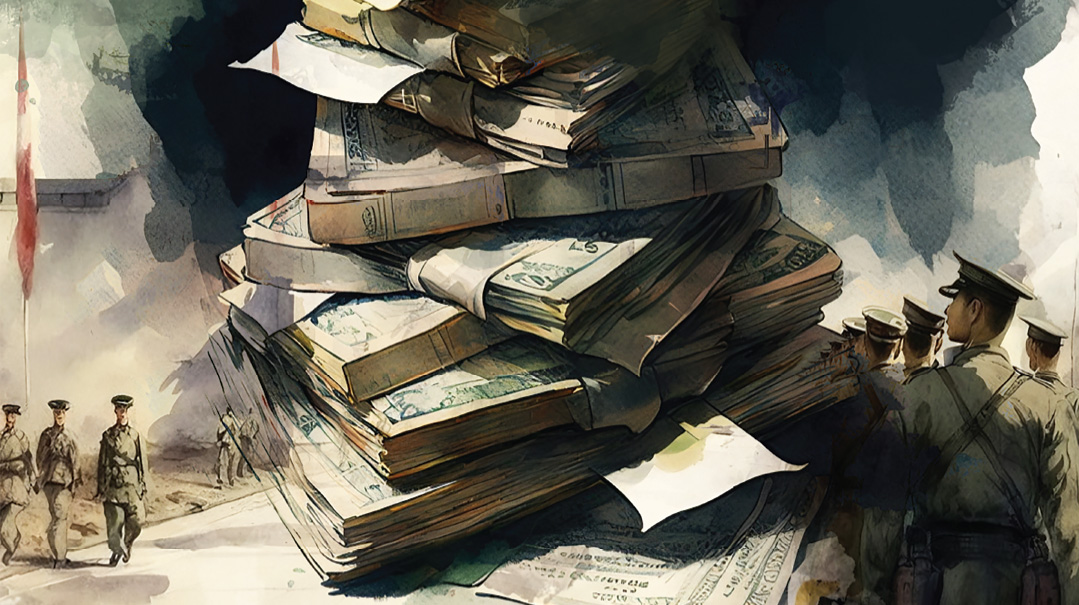
Lost and Found
Name: Nancy R.
Destination: Hong Kong
I’M
a manufacturer, and frequently travel to China on business. On a recent trip with my assistant, Chana, we planned on spending Shabbos in Hong Kong, and arranged for a driver to pick us up late on Thursday evening and drive us through the borders to our hotel in Hong Kong.
The trip began smoothly. We arrived at the border in China, and I ran into the rest area for a few minutes. The border patrol agents checked our passports and nodded us through.
We arrived at the first Hong Kong border and again, we were easily waved through. Trouble began at the second Hong Kong border. They asked us to remove our suitcases for a search. It was annoying, but we had no choice. As we began removing our suitcases from the minivan, I suddenly screamed, “Oh, no!” My messenger bag was gone.
My entire life was in that bag. It held my credit cards, identifications, and several thousand dollars of cash for my business trip. I needed to find my bag. And while you never want to lose a pocketbook, China is the wrong place to lose it.
It was impossible for me to go back through the borders, so Zhang, our driver, offered to go for me. In his broken English, he promised me that he’d speak to the police and search for the bag. He unloaded our luggage at the side of the highway and sped off.
A
fter several moments of silence, reality hit: We were two women on a dark highway in Hong Kong late at night, basically penniless. (Chana had a bit of money on her, but not enough to help.) Too frightened to talk, we stood silently in the darkness watching the occasional car whiz by.
An hour passed, and we still hadn’t heard from our driver. Would he actually come back for us or would we spend the night on the highway? Would we make it to the hotel alive? Chana was agitated because the Chabad house was closing and we hadn’t eaten anything that day. She was worried about dinner, but I was worried about our lives!
I was desperate to call our driver, but I didn’t have his number. Even if Zhang did find the bag, would he return it to me? Forget the business trip — I needed money to pay for our transportation, hotel, and food.
I finally reached my son, who tracked down Zhang’s number.
I called him in a panic. “Zhang! It’s Nancy! You? Find? bag?” I screamed.
“Me no find,” he replied.
My heart sank. This couldn’t be happening. Then I realized that Zhang was likely searching at the wrong border. The bag had likely been lost at the border in China. “No Hong Kong border! It’s at the China border!” I screamed.
And with that, Zhang’s phone went dead.
I’d never felt so helpless and stranded in my life. It was a moment of deep connection as I cried and davened. I had zero options and no one to rely on beside Him.
At last my phone rang. It was Zhang.
“I find!” he said.
I was so happy that I literally started dancing right there on the deserted highway singing “Thank you Hashem!”
At last, Zhang returned with a policeman. In broken English the officer explained that he had to take me to identify the bag before he could give it to me.
I went along with the policeman, while Chana stayed in the car with our luggage.
As we drove back to the police station, the officer began telling me about his brother in New York. Buddy, I was thinking, just give me my bag and get me out of here!
B
ack at the Chinese border, I was able to identify my bag with my ID, and quickly opened the bag to check on the contents. But while all of my ID and credit cards were in place, the cash was gone. (The thief actually left me a very generous 70 dollar “tip.”)
“This is not acceptable!” I demanded. “I had cash inside this bag. Where is the money?”
Stealing is considered a very serious crime in China with very severe penalties. The officer who had found the bag looked flustered and offered to help me search for the cash. “Let’s go outside the building. You check under the bench, and I’ll check in the bushes….”
Several men were milling around outside and I wondered which one was the thief.
The officer looked behind a bush, and what a miracle! He pulled out a wad of soaking wet cash. Every dollar was there. I eyed him suspiciously as it dawned on me that he was the thief.
“Please, just tell everyone that the money was lost and not stolen,” he begged me. “Please, write in the report that the money was lost.”
Meanwhile, an hour and a half had already passed and I had no way to reach Chana because I’d forgotten my phone. I felt so bad for her; she probably thought I’d been killed by now. (She actually was hyperventilating in fear. That’s what you think when you’re in a third-world country.)
When I finally made it back to the side of the highway where the minivan was parked, I saw Zhang pacing outside.
“You here! You here!” he exclaimed.
Chana jumped out of the car and hugged me for five minutes straight. “I thought you were gone!” she cried.
“On to more important things,” I responded. “Did you work out the food?”
“Yes! It was delivered to the hotel.”
A fresh dinner from Hong Kong Chabad was waiting for us when we finally made it to the hotel. Though I was exhausted, it took me some time to get to sleep: Marbeh nechasim marbeh de’agah. I first had to blow dry my soaking wet cash.
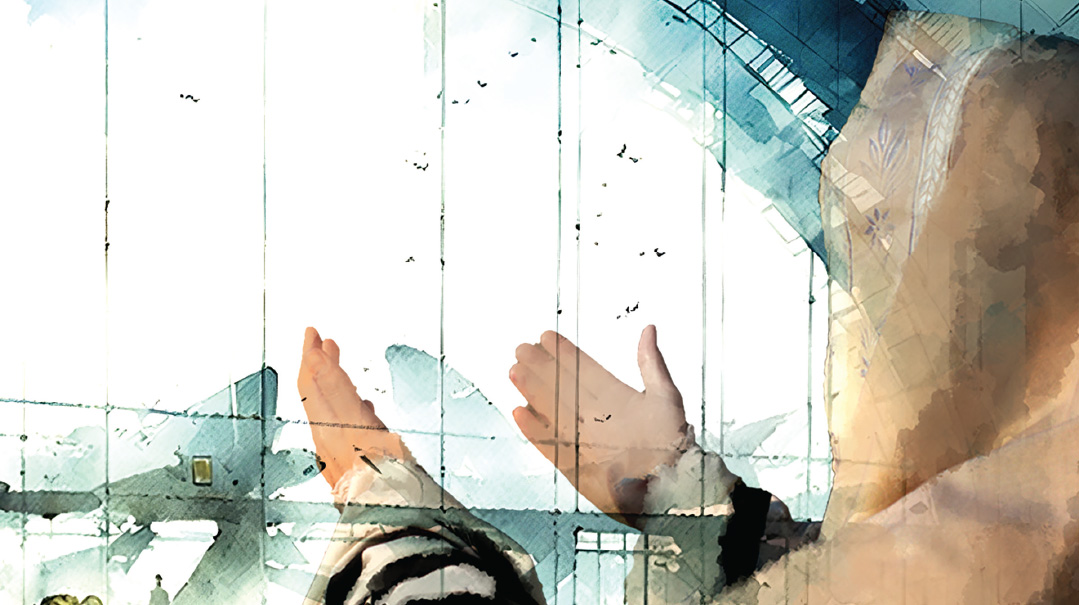
Comeback
Name: Rabbi Aaron Kotler,
President Emeritus, Beth Medrash Govoha
Destination: Frankfurt International Airport
I
was in the airport in Frankfurt on a stopover, headed to Lithuania on a classic Rabbi Ronnie Greenwald mission: a mix of spy craft and diplomacy with the constant overriding objective of increasing kavod haTorah.
Our goal was to protect a treasure trove of hundreds of sifrei Torah stolen by the Nazis, along with hundreds of thousands of seforim and kisvei yad. The New York Times had published an article about this Judaica collection, which the Nazis had intended to use as exhibits for the museum they would set up to commemorate the world they planned to destroy.
After the war, the sifrei Torah and seforim languished in the damp basement of a decaying Vilna church for over 50 years. Now, Rabbi Greenwald was determined to restore these sifrei Torah and seforim to Jewish hands.
IT
was time for Shacharis, and we were a group of four. Frankfurt Airport, Germany’s largest, is a busy place, and I thought perhaps we could find one of those airport meditation rooms and use it to daven. When I stopped a middle-aged policeman and asked in my rudimentary German if he knew where I might find the prayer room, his response was chilling.
He looked at me with vacant blue eyes, and in coarse, guttural German said, “Wir haben keine jüdischen Synagogen, wir haben sie alle 1938 niedergebrannt.” [We don’t have any Jewish synagogues, we burned them all on Kristallnacht in November 1938.]
Now that insult reflected but the slightest shadow of what our people, including my own family, suffered and endured, but it sure got me mad. I walked back to Ronnie, who was standing in the middle of a busy concourse, and shared with him the German’s words. He responded, “Let’s daven right here.”
I said, “Ronnie, let’s find a quiet corner.”
“No, here is the best spot,” he responded.
Then he looked over at the check-in counters, which were even busier, and said, “That’s where we will daven.”
I
knew that Ronnie had real-life experience with Nazis; as a personal friend of Wolfgang Vogel, a top spy in the East German Stasi, a KGB counterpart, Ronnie had attended Wolfgang’s 80th birthday party, which was a spy-fest; and many Stasi spies, including S.S. officers were there.
So I dutifully followed Ronnie, and we began to daven. Only Ronnie was in no mood for a quiet tefillah; he began to daven in the loudest voice possible, shuckeling and acting as if he were back in Monsey’s Satmar shtibel.
I thought to shush him but knew better. You don’t shush a man who convinced the Communists to free great Jewish refuseniks like Yosef Mendelevich, Eliyahu Essas and Natan Sharansky. You don’t shush a man who dined with dictators and presidents alike, a man who was the confidante of some of the most illustrious men and most unsavory creatures to have walked this planet.
We davened. Very loud.
Two young Israelis, comfortable in their dreadlocks, tattoos and seemingly in their hard-core secularism, passed by and started to harangue us. “You chareidim have no social skills, no situational awareness and no sense of propriety. We know that you need to daven, but CAN’T YOU FIND A NICE CORNER to do your religious business?”
Emotionally, Ronnie shared what the police officer had said. And the two Israelis, who had been giving us mussar just a minute ago, asked to put on tefillin and proceeded to daven with us. Aloud. The six of us, though four short of a minyan, created quite the stir.
Unwittingly, that thug in the airport stirred us to daven with real heart, aloud with all our senses, to our Father.

Road Runners
Name: Leah’le and Avi Gold*
Destination: Detroit, Michigan
WE
got married on a Monday in New York. The weeknight sheva brachos were in New York, while Shabbos sheva brachos would be held in my hometown of Detroit, and we were scheduled to leave New York on an early Friday morning flight.
We arrived early at the airport, but our flight was delayed, and then delayed again. Sitting in the terminal, I was a bit nervous. We had to make it to Detroit. I didn’t know a single person in New York, and all of our relatives were already in Detroit. We couldn’t spend our Shabbos sheva brachos alone!
When the flight was pushed off yet again, I realized that we couldn’t rely on making it in time for Shabbos. We were totally stuck. I pulled out my phone and checked Waze.
“If we rent a car and leave this minute, we’ll make it to Detroit 45 minutes before Shabbos,” I said to my husband.
My brand-new husband was skeptical. “What about traffic?” he asked.
“There’s never any traffic in the Midwest! What could possibly go wrong?”
My husband was from New York and had never spent more than a few hours in a car. He was very hesitant. But how could he say no to his wife of four days? Rashly, we decided to go.
We quickly rented a car and were on our way at 10:15 a.m. It was a ten-hour trip on a good day, and lichtbentshen was at 8:45. We didn’t have any spare time.
There was a bit of traffic in the beginning of the trip and we considered turning around, but decided to venture on. We did have a back-up-plan: Cleveland was on the way, so we figured, in the worst case, we’d stop there for Shabbos.
Once the traffic cleared up, we drove at close to 100 miles an hour, a speed that we maintained for the majority of the trip. (By some miracle we weren’t pulled over. It would have cost us valuable minutes we didn’t have.)
We took turns driving. I was panicking — it would be my fault if we spent our Shabbos sheva brachos in a rundown motel room without any food. My husband, on the other hand, was chilled, and took a long nap as I drove.
W
hen we drove on the bridge that crosses the Kruger River, I made the mistake of cutting off a black Mercedes. The driver then sped up in front of us and came to a dead stop. I slammed on the brakes to avoid a collision.
The driver got out and began yelling and calling us very unpleasant names. He even tried to get into our car, but thankfully someone else stopped, let me merge, and we were able to escape.
The race was on.
We were careful not to tell anyone what we were up to because we didn’t want to scare our relatives. At two p.m., we got a frantic phone call from my brother. “Your flight is being diverted to Chicago! What are you going to do? Everyone is hysterical, freaking out that you’ll be spending Shabbos in Chicago!”
“Don’t worry,” I said vaguely. “We’re not on the plane, we’re driving.”
“What? Where are you? When did you start driving?”
I was careful not to mention that we were near Pittsburgh, six hours away from our destination.
Next my father called. “Please don’t tell me that you’re on the road!” he said. “This is my nightmare!”
But we were.
My father spent the next few hours quietly worrying as the guests arrived for a (very likely chassan and kallah-less) sheva brachos.
We had no food or drinks in the car, but there was no time to stop. (We stopped once during the ride for gas, and then once again when we were close to our destination.)
T
he end of the trip was even more stressful. We were passing Cleveland. Should we cut our losses and stop there for Shabbos? We’d miss our own Shabbos sheva brachos, but at least we’d spend Shabbos in a Jewish community. We checked Waze, and concluded that we could just about make it, though a mishap would be disastrous. We decided to continue.
I breathed a deep sigh of relief when we pulled up to our apartment in Detroit. It was 8:32.
There was no time for showers or fresh makeup, but I was so happy to be there that I didn’t care. When I finally walked into the hall, my older sister embraced me but she didn’t wish me mazel tov. Instead she said, “You’re a lunatic. You just did something totally insane!”
I couldn’t argue. And I certainly don’t recommend this as a newlywed-bonding activity. But since we were destined to make it, we did. With 13 minutes to spare.
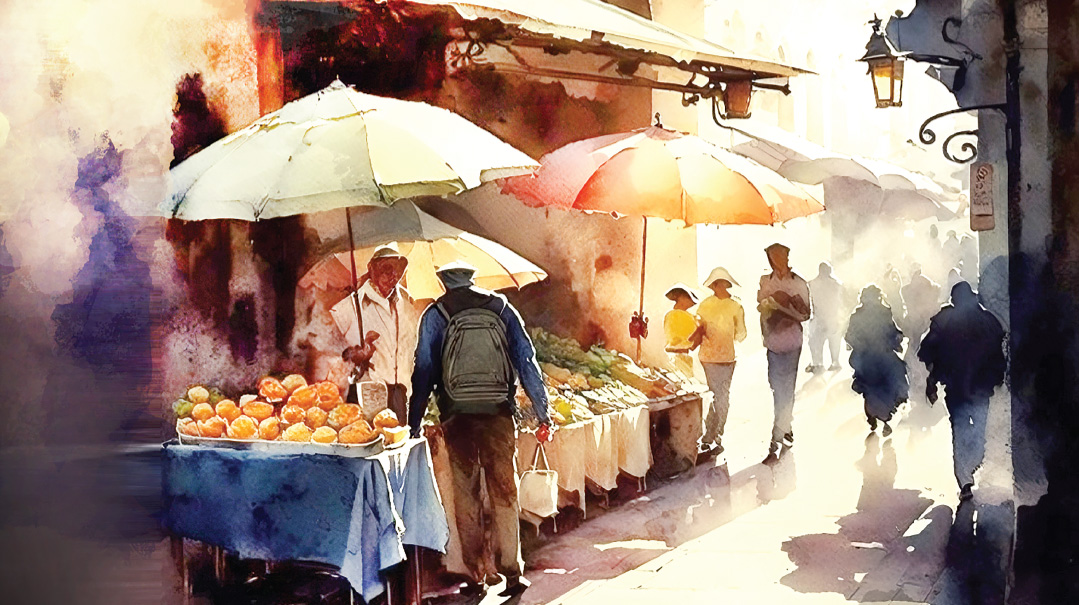
Border Control
Name: Yaffa Weinstock, attorney
Destination: Tijuana, Mexico
MYfamily loves traveling to interesting places. While spending a weekend in Los Angeles, we decided to visit Mexico, a two-and-half hour drive away. We left L.A. early on Friday morning and drove to San Diego, where we parked the car. (It’s much faster to walk across the border than to drive through the main Tijuana border crossing.)
I was shocked by how easy it was to get from the United States into Mexico. We walked through a subway-style metal turnstile, and within seconds we found ourselves in a foreign county. There was no border control or customs.
Walking onto the streets of Tijuana was a culture shock. The streets were dirty, unpaved, and decorated with colorful flags. Men and women were riding bicycles, while children ran around.
We enjoyed looking around the shops that were filled with interesting spices, woven blankets and other trinkets. We were approached by quite a few Hispanic men with menus trying to lure us into their restaurants. It was interesting to see so many dental clinics (many Americans cross the border for cheap dental care) and several Mexicans asked to take pictures with us.
After an hour of touring, we decided to reenter America and head back for Shabbos.
What could possibly go wrong?
WE
found the border and walked up to the border control building, but an official yelled at us to return to the back of the line. We did, but realized with sinking hearts that the line was three miles long. We hadn’t factored in that Tijuana boasts the most frequently crossed border in the world. That doesn’t work well for Erev Shabbos. The line was at least nine hours long, and Shabbos was in six.
My heart started racing. There was no way we could spend Shabbos in Tijuana! There were no Jews or kosher food in the area, and all we had with us were several snack bags and water bottles.
It was time for Plan B. We found a driver who promised to get us through the border quickly. We weren’t sure what his plan was or if it was legal, but we were desperate.
He quoted an astronomical sum, which we agreed to pay. We didn’t have enough cash, so we promised to go straight to an ATM machine when we hit American territory.
But the driver wouldn’t take us unless we paid up front. The clock was ticking, the kids were kvetching and we were out of options. Only Hashem could get us back into America before Shabbos.
We quietly slipped our way into the front of the border line. People began yelling, and the border control officials were not amused. We tried pleading our case. “We’re American citizens. We have small children and we have to get back in for our Shabbos.”
By some miracle, they let us through. We went through airport-style security, and finally made it into America three hours before shkiah. There were a few harrowing moments when we couldn’t find our car and again when the highway was shut, but thankfully we arrived home before Shabbos. It felt so good to be on American soil!
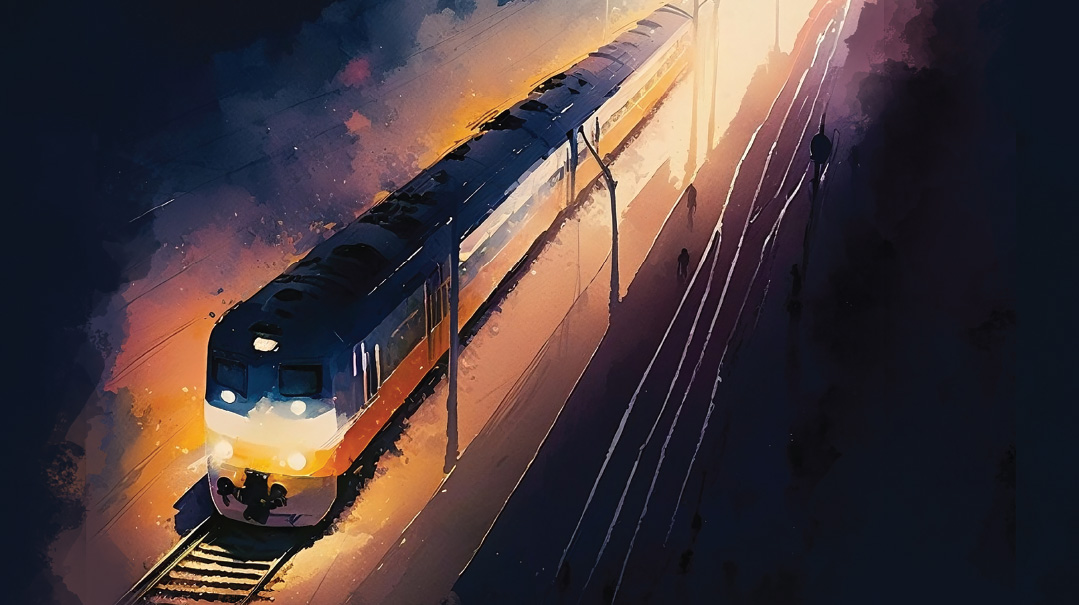
On the Right Track
Name: Faigy K.
Destination: Antwerp
During the summer after seminary, my roommate from Paris invited me to visit. I had several other friends and relatives in Europe, so I decided to make a two-week trip out of it, together with a good friend. The year was 2001, Europe was a safer place for Jews than it is today, and helicopter parenting wasn’t yet a thing. We were two 18-year-olds trotting around Europe with no cell phone.
We stayed with my roommate in Paris for several days and spent the last day exploring the Palace of Versailles. Then we hurried to the train station to catch a train to Antwerp, where we planned on spending Shabbos with relatives.
We ran around the huge train station, trying to find an English speaker to direct us to our platform. At last we found the right train, but there was no time to buy tickets.
“Just get on, and buy tickets on the train,” someone advised us.
We jumped on the train as it was pulling away. A conductor saw two frazzled young women and began explaining to us that when you buy tickets on the train, the price is significantly higher.
Then he looked at us shrewdly. “But if you pay cash, it’s 20 euros instead of 100.”
We had limited euros left. Relieved to hear about this nice cash discount, we handed him the money. “I’ll take care of the tickets later,” he said, walking away.
We sat down and took out our books and sandwiches, happy to relax a bit, without realizing we had bribed our way onto the train.
Then an announcement rang out in several languages: “Prepare your ticket and documents for inspection.”
We had two problems: we had no tickets, and my friend had left her passport behind. She didn’t want to lose her passport while traveling throughout Europe and somehow she managed to cross five countries illegally with no ID.
We figured that the conductor who took our money would help us out, but when the door opened, another conductor was there. He began checking everyone’s IDs and stamping their tickets. As he got closer to our seat, I began envisioning being led off the train in handcuffs and wondered what the jails in Belgium were like. But at the last moment the back door opened. “Our conductor” walked in and began stamping tickets.
“Tickets?” We asked him.
“Shhh, later,” he responded.
WE
got off at a station in Brussels to catch a connecting train to Antwerp. This time we purchased tickets and headed to our platform. There were several shady characters waiting there, so we decided to wait in the main terminal and return in time for departure. Twenty minutes later, we returned. Departure time came and went, but there was no train and no people. Something was wrong.
We returned to the ticket booth for an explanation. “We announced in five different languages that the platform was switched,” a man informed us. “The train left ten minutes ago. You can catch the next train to Antwerp tomorrow morning.”
We looked around helplessly. The train station was deserted and dimly lit and several homeless individuals were sleeping on the concrete floor. We had no cell phone and no one knew where we were. A creepy man walked over and offered to help us find a hotel room for the night. We ran the other way and I thought our lives were over.
Suddenly another man came running over to us with a giant black dog that was bigger than him.
“Girls, I overheard your predicament,” he said. “Run to platform nine. There’s a train leaving in five minutes that’s heading to the Gare du Nord. If you get on that train, you may make it to the Nord station in time to catch the only late-night train to Antwerp that is leaving at two a.m.”
We didn’t know who the man was or why he was there, but on the long shot he was telling the truth, we ran to platform nine as though our lives depended on it (which they probably did).
We got there seconds before they shut the train doors and found ourselves on some unknown train going to some unknown location in the middle of the night.
We glanced around the empty car. Apparently, the midnight trains do not attract high-class European society. It was just us and two shady characters who looked like drug dealers.
We sat down in corner seats and started crying and saying Tehillim. I had never felt the need for His protection so strongly. When a conductor entered our cabin, we began sobbing even harder.
We had repeated the same mistake: we had no tickets and no identification. The conductor walked over and thankfully didn’t ask us for tickets. “What’s the matter, young women?” he asked.
“Where are we? And where are we going?” I choked out.
“You’re in Brussels. You are heading for the Gare du Nord. Does that work for you?”
“We really need to go to Antwerp!” I cried.
“Unfortunately, I cannot change the direction of the train but there is one late-night train to Antwerp and I’ll help you find it,” he reassured us.
True to his word, the kind conductor helped us find our connecting train. With the help of Hashem’s sundry messengers (we still wonder if the guy with the dog was Eliyahu Hanavi), we arrived safely in Antwerp sometime before sunrise.
As we drifted off to sleep that night, we assured each other that we would never again travel for the rest of our lives. But that resolve lasted until ten a.m. the next morning when we boarded another train (this time with tickets) for a once-in-a-lifetime chance to see one more European city.
With great appreciation to Shifra Cyment and Daniel Soloff for their help with this article.
(Originally featured in Mishpacha, Issue 956)
Oops! We could not locate your form.

